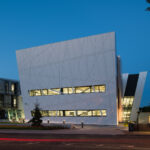The ACED Skills Exchange and Development award was created for Alliance members to benefit from the skills and experience of other member organisations. The aim is for the individual to learn a new skill or technique that will provide a step-change in their career development. Of the four ACED Skills Exchange and Development awards, three have involved the University of Manchester. Find out more below.

Vanitha Sivalingam
Collaborative team
Vanitha Sivalingam, University of Manchester
Fiona Walter, University of Cambridge
Emma Crosbie University of Manchester
Summary
Over 1300 women in the UK are diagnosed with vulval cancer annually. Early detection of vulval cancer reduces surgical morbidity and improves survival. While there is no role for population-based screening, there are chronic skin conditions which increase the risk of vulval cancer including lichen sclerosus(LS), lichen planus(LP) and vulval intraepithelial neoplasia(VIN). Understanding who is at risk of developing vulval cancer is a high priority research question. A cancer risk prediction model will help personalise individual risk and design population-based interventions.
The ACED Travel Award has enabled me to collaborate with researchers at the Universities of Manchester and Cambridge. We are using linked population data from the primary care and national cancer records to establish 1) the incidence and prevalence of LS, LP and VIN in the UK, 2) the incidence of vulval cancer in women with LS, LP and VIN and compare their risk to matched-controls 3)the interval between diagnosis of a precursor condition and the development of a vulval cancer and 4)the route of diagnosis of all vulval cancers. We hope that these findings will quantify the risk and develop prediction strategies to tailor treatment and follow-up for the early detection of vulval cancer in high risk women.

Christian Hoerner
Collaborative team
Christian Hoerner, University of Stanford,
Emma Woodward, University of Manchester,
Eamonn Maher University of Cambridge
Summary
While the immediate need for skill transfer is for the funded ACED Pilot Award, platelet transcriptomics may play a much broader role in cancer early detection as demonstrated by seminal platelet RNAseq studies in breast, lung, colorectal and other cancers. The intent is to ‘plant a seed’ of platelet preparation skills at the ACED institutions in Manchester and Cambridge, which can then serve as point of contact to distribute these skills to researchers investigating other cancer types within and beyond the funded ACED ELECTRIC Award. To our knowledge, only two labs within the ACED work on platelet-related projects: our own lab and Owen McCarty’s group at OHSU, Portland, OR. With this Skill Exchange and Development Travel Award, we aim to transfer our skills to our collaborators at the Universities of Manchester and Cambridge by providing hands-on training.

Kelly Fagan Robinson
Collaborative team
Kelly Fagan Robinson, University of Cambridge,
Ellena Badrick, University of Manchester
Summary
This targeted skills exchange award will directly support upfront costs for cross-institutional. auditing of a healthcare modelling course (hosted by Manchester, attended by partners from Cambridge), jointly delivering a workshop addressing evidence incommensurability between modellers and medical anthropologists, with the aim of making resulting learnings available to the ACED summer school and the whole ACED online community. This project addresses communication gaps between Medical Anthropology, and Health and Risk Prevention modelling. It will broaden understanding of data in both disciplines. Advances in early detection of cancer for seldom heard and marginalised populations are beleaguered by poor attendance at primary care sites and incomplete population screening data. Changes in this arena are therefore vital. Cross-disciplinary understanding will energise new approaches to cancer research for both partners. Gaining perspectives from both disciplines can improve qualitative and quantitative data-sharing, equipping researchers with improved tools for more effective research design and findings communication, ultimately improving outcomes in the long term.
Navigation
ACED-Funded PhD Students
Meet the early career researchers funded by ACED.
Funding Opportunities
Discover the opportunities for ACED Member organisations to lever additional ACED funding in strategic areas.
Training and Development
A core goal at ACED Manchester is to enable the next-generation of early detection research scientists to become future leaders.



